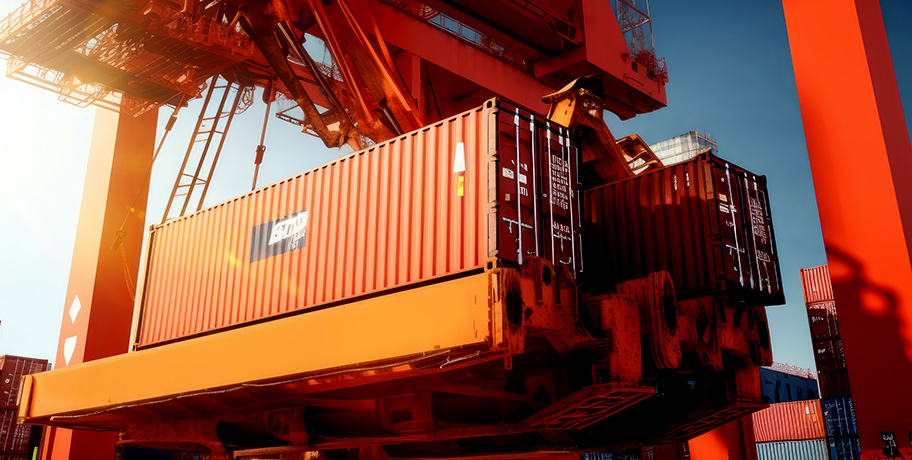HOW TO COUNTERACT THE IMPACT OF SUPPLY CHAIN DISRUPTIONS
Sep 28, 2021
How to Counteract the Impact of Supply Chain Disruptions
As the global supply chain has witnessed over the last few years, disruptions, both expected and unexpected, can have an overwhelming impact on each sector of the supply chain. Some disruptions only affect certain pieces of the supply chain, while others cause issues across the board. Let’s take a look at some of the major types of disruptions the industry may experience and explore ways shippers can mitigate such challenges.

Forces of Nature
Natural disasters are somewhat unpredictable in terms of potential damage they cause, but they also come in varying forms that can dismantle transportation resources in the blink of an eye. For example, hurricanes bring intense flooding and powerful winds to wide areas over a short period, often resulting in loss of power, limited access to roadways and other infrastructure obstacles. With hurricanes and similar disruptions, such as floods, tornados and wildfires, the supply chain must stay aware of where and how they will affect various regions to both prepare, adapt and react in a safe and efficient manner to minimize disruptions to supply chain operations.
Cyber Attacks
Cybersecurity is an important investment within the supply chain, no matter which sector a company falls under. As an industry with the vulnerability of global interdependence, one cyber-attack against a single organization can cause delays beyond that organization’s home base. From a partner’s misstep to an internal employee clicking on an unsecure email link, the smallest mistake can introduce the largest problems. According to IBM’s Costs of a Data Breach Report 2023, the average cost of a data breach for a business is $4.5 million. Keeping a security system and team in place to monitor and combat attacks that threaten company reputation and profitability is an optimal approach, and many companies that may not have previously felt the urge to execute such tactics are finding it imperative to keep their finances, information, partners and teammates safe.
Pandemics
While much less common than natural disasters and cyber-attacks, one of the most obvious global disasters that can occur is one we have all experienced as of late. Over the last two years, the current global pandemic has seen highs and lows with the fluctuation of shipping delays, port congestion, lack of supplies, employee shortages and more. The list goes on, and the impact continues. The effects of pandemics or public health crises have the ability to hinder movement of freight at each stage, from production to delivery. If one stage experiences a delay, the rest will likely follow suit.
Helpful Tips for Shippers
Through the eyes of a shipper, it’s important to learn how to mitigate the cost of disruptions, considering some are avoidable while others are not. Here are some tips you need to keep in mind to make your supply chain more resilient in the face of disruptions.
Stay proactive
Thoughtfully build up inventory in advance of fulfillment to avoid lack of supply in the future.
Operational audit
Conduct an audit to locate current or looming shipping vulnerabilities that may cause a disruption down the road. Prepare contingency plans well in advance of possible disruptions based on audit insights.
Identify plans B and C
Identify backup suppliers to counteract shortages with a primary supplier that may occur on short notice.
Secure a reputable partner
Explore a partnership with a third-party logistics expert to gain enhanced visibility. 3PLs have a wide network of carriers with a diverse equipment options that allow shippers to mitigate disruptions.
Determine all shipping options
Explore alternative modes of shipping your freight in a tight market. If you have time-sensitive cargo to that needs to travel over the ocean, then air freight might be a possible option for you. Looking at alternative methods of shipping your freight helps with shipping challenges as well as providing cost-saving options.
Additionally, instilling characteristics and practices that encompass agility and adaptability, market awareness and enhanced communication promote overall operational effectiveness and efficiency.
While the lack of stability that supply chain disruptions can cause is intimidating, the industry has learned a lot from recent major disruptions, from where to improve policies and procedures to how diversifying a business model can save money and time ahead of future disruptions. As members of the supply chain, shippers and their partners now understand more than ever that preparing for the unexpected and improving performance and technology benefits the work of today and the results of tomorrow.
With more than 80,000 carriers in our network and industry-leading services across all transportation modes, NTG can be your resource whether you’re working through a disruption or not. Click here to get a shipment quote and try us out today.



